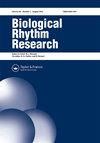土耳其学龄前儿童亲子睡眠互动适应量表(PSIS)的心理测量评估
IF 0.9
4区 生物学
Q3 BIOLOGY
引用次数: 0
摘要
摘要考虑到儿童早期睡眠问题的高发率以及父母对儿童睡眠习惯的影响,亲子睡眠互动具有重要意义。本研究旨在调查土耳其学龄前儿童亲子睡眠互动量表(PSIS)的心理测量特性。我们评估了PSIS的内部一致性、测试-再测试可靠性、结构有效性和标准有效性。这项研究是在2021年1月至6月期间对424名学龄前儿童家长进行的。验证性因子分析(CFA)证实了量表的三维和12项结构具有可接受的拟合值。该量表各因素的克朗巴赫α系数分别为睡眠依赖0.81、睡眠强化0.76和睡眠冲突0.72。测试-再测试相关性分别为0.87、0.86和0.94(p<0.05)。儿童症状外化量表(PPSC)外化评分与PSIS总分和睡眠冲突评分显著相关。PPSC内化评分与PSIS总分和睡眠冲突评分显著相关。我们的研究首次确定了土耳其学龄前儿童PSIS的有效性和可靠性。本文章由计算机程序翻译,如有差异,请以英文原文为准。
Psychometric evaluation of the Turkish Adaptation of Parent-Child Sleep Interaction Scale (PSIS) for preschoolers
ABSTRACT Parent-child sleep interaction is significant considering the high incidence of sleep problems in early childhood and the influence of parents on children’s sleep habits. This study aimed to investigate the psychometric properties of a Turkish adaptation of the Parent-Child Sleep Interaction Scale (PSIS) for preschoolers. We evaluated the internal consistency, test−retest reliability, construct validity, and criterion validity of the PSIS. The study was carried out with 424 parents of preschoolers between January and June 2021. The Confirmatory factor analysis (CFA) confirmed the three-dimensional and 12-item structure of the scale with acceptable fit values. The Cronbach’s alpha coefficients for the factors of the scale were 0.81 for sleep dependence, 0.76 for sleep reinforcement, and 0.72 for sleep conflict. Test-retest correlations were 0.87, 0.86, and 0.94, respectively (p < .05). The Pictorial Pediatric Symptom Checklist (PPSC) externalizing scores correlated significantly with the PSIS total scores and sleep conflict scores. The PPSC internalizing scores were significantly correlated with the PSIS total and sleep conflict scores. Our study is the first to establish the validity and reliability of the PSIS for Turkish preschoolers.
求助全文
通过发布文献求助,成功后即可免费获取论文全文。
去求助
来源期刊

Biological Rhythm Research
生物-生理学
CiteScore
3.00
自引率
9.10%
发文量
34
审稿时长
6-12 weeks
期刊介绍:
The principal aim of Biological Rhythm Research is to cover any aspect of research into the broad topic of biological rhythms. The area covered can range from studies at the genetic or molecular level to those of behavioural or clinical topics. It can also include ultradian, circadian, infradian or annual rhythms. In this way, the Editorial Board tries to stimulate interdisciplinary rhythm research. Such an aim reflects not only the similarity of the methods used in different fields of chronobiology, but also the fact that many influences that exert controlling or masking effects are common. Amongst the controlling factors, attention is paid to the effects of climate change on living organisms. So, papers dealing with biometeorological aspects can also be submitted.
The Journal publishes original scientific research papers, review papers, short notes on research in progress, book reviews and summaries of activities, symposia and congresses of national and international organizations dealing with rhythmic phenomena.
 求助内容:
求助内容: 应助结果提醒方式:
应助结果提醒方式:


